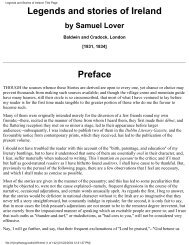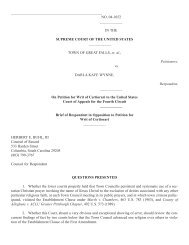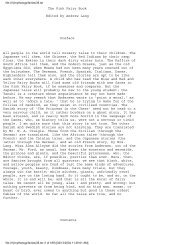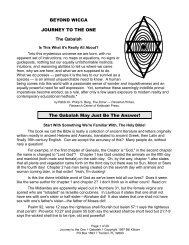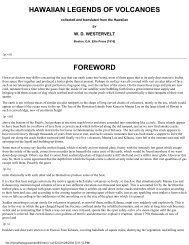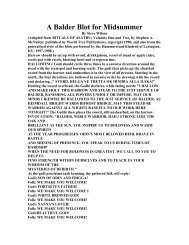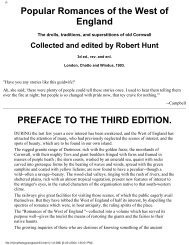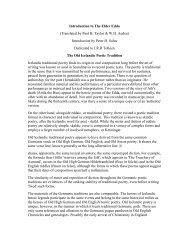You also want an ePaper? Increase the reach of your titles
YUMPU automatically turns print PDFs into web optimized ePapers that Google loves.
With full credit for a clean floor.<br />
Thus, whether the fairies came or not to pay a visit to them during their sleep, the house would be clean by the morning, and the table<br />
ready set for breakfast. it appears that the places most frequently resorted to by this species were rushy combes surrounded by smooth hills<br />
with round tops, also the banks of rivers and the borders of lakes; but they were seldom seen at any time near rocks or cliffs. So more tales<br />
about them are found in districts of the former description than anywhere else, and among them maybe mentioned Penmachno,<br />
Dolwyddelen, the sides of Moel Siabod, Llandegái Mountain, and from there to Llanberis, to Nantlle Lakes, to Moel Tryfan 1 and Nant y<br />
Bettws, the upper portion of the parish of Beddgelert from Drws y Coed to the Pennant, and the district beginning from there and<br />
including the level part of Eifion, on towards Celynnog Fawr. I have very little doubt that there are many traditions about them in the<br />
neighbourhood of the Eifl and in Lleyn; I know but little, however, about these last. This kind of fairies was said to live underground, and<br />
the way to their country lay under hollow banks that overhung the deepest parts of the lakes, or the deepest pools in the rivers, so that<br />
mortals could not follow them further than the water, should they try to go after them. They used to come out in broad daylight,<br />
p. 85<br />
two or three together, and now and then a shepherd, so the saying went, used to talk and chat with them. Sometimes, moreover, he fell<br />
over head and ears in love with their damsels, but they did not readily allow a mortal to touch them. The time they were to be seen in their<br />
greatest glee was at night when the moon was full, when they celebrated a merry night (noswaith lawen). At midnight to the minute, they<br />
might be seen rising out of the ground in every combe and valley; then, joining hands, they would form into circles, and begin to sing and<br />
dance with might and main until the cock crew, when they would vanish. Many used to go to look at them on those nights, but it was<br />
dangerous to go too near them, lest they should lure the spectator into their circle; for if that happened, they would throw a charm over<br />
him, which would make him invisible to his companions, and he would be detained by the fairies as long as he lived. At times some<br />
people went too near to them, and got snatched in; and at other times a love-inspired youth, fascinated by the charms of one of their<br />
damsels, rushed in foolhardily to try to seize one of them, and became instantly surrounded and concealed from sight. If he could be got<br />
out before the cock crew he would be no worse; but once the fairies disappeared Without his having been released, he would never more<br />
be seen in the land of the living. The way to get the captured man out was to take a long stick of mountain ash (pren criafol), which two or<br />
more strong men had to hold with one of its ends in the middle of the circle, so that when the man came round in his turn in the dance he<br />
might take hold of it, for he is there bodily though not visible, so that he cannot go past without coming across the stick. Then the others<br />
pull him out, for the fairies, no more than any other spirit, dare touch the mountain ash.<br />
p. 86<br />
We now proceed to give some of Mr. Jones' legends, The first is one which he published in the fourth volume of the Brython, p. 70,<br />
whence the following free translation is made of it:--<br />
'In the north-west corner of the parish of Beddgelert there is a place which used to be called by the old inhabitants the Land of the Fairies,<br />
and it reaches from Cwm Hafod Ruffydd along the slope of the mountain of Drws y Coed as far as Llyn y Dywarchen. The old people of<br />
former times used to find much pleasure and amusement in this district in listening every moonlight night to the charming music of the fair<br />
family, and in looking at their dancing and their mirthful sports. Once on a time, a long while ago, there lived at upper Drws y Coed a<br />
youth, who was joyous and active, brave and determined of heart. This young man amused himself every night by looking on and listening<br />
to them. One night they had come to a field near the house, near the shore of Llyn y Dywarchen, to pass a merry night. He went, as usual,<br />
to look at them, when his glances at once fell on one of the ladies, who possessed such beauty as he had never seen in a human being. Her<br />
appearance was like that of alabaster; her voice was as agreeable as the nightingale's, and as unruffled as the zephyr in a flower-garden at<br />
the noon of a long summer's day; and her gait was pretty and aristocratic; her feet moved in the dance as lightly on the grass as the rays of<br />
the sun had a few hours before on the lake hard by. He fell in love with her over head and ears, and in the strength of that passion--for<br />
what is stronger than love!--he rushed, when the bustle was at its height, into the midst of the fair crowd, and snatched the graceful damsel<br />
in his arms, and ran instantly with her to the house. When the fair family saw the violence used by a mortal, they broke up the dance and<br />
ran after her<br />
p. 87<br />
<strong>Title</strong> <strong>Page</strong><br />
towards the house; but, when they arrived, the door had been bolted with iron, wherefore they could not get near her or touch her in any<br />
way; and the damsel had been placed securely in a chamber. The youth, having her now under his roof, as is the saying, endeavoured, with<br />
all his talent, to win her affection and to induce her to wed. But at first she would on no account hear of it; on seeing his persistence,<br />
however, and on finding that he would not let her go to return to her people, she consented to be his servant if he could find out her name;<br />
but she would not be married to him. As he thought that was not impossible, he half agreed to the condition; but, after bothering his head<br />
with all the names known in that neighbourhood, he found himself no nearer his point, though he was not willing to give up the search<br />
hurriedly. One night, as he was going home from Carnarvon market, he saw a number of the fair folks in a turbary not far from his path.<br />
They seemed to him to be engaged in an important deliberation, and it struck him that they were planning how to recover their abducted<br />
sister. He thought, moreover, that if he could secretly get within hearing, he might possibly find her name out. On looking carefully<br />
around, he saw that a ditch ran through the turbary and passed near the spot where they stood. So he made his way round to the ditch, and<br />
crept, on all fours, along it until he was within hearing of the family. After listening a little, he found that their deliberation was as to the<br />
fate of the lady he had carried away, and he heard one of them crying, piteously, "O Penelop, O Penelop, my sister, why didst thou run<br />
away with a mortal?" "Penelop," said the young man to himself, "that must be the name of my beloved: that is enough." At once he began<br />
file:///I|/mythology/celtic/26/26.html (48 of 237) [01/22/2004 12:42:26 PM]



